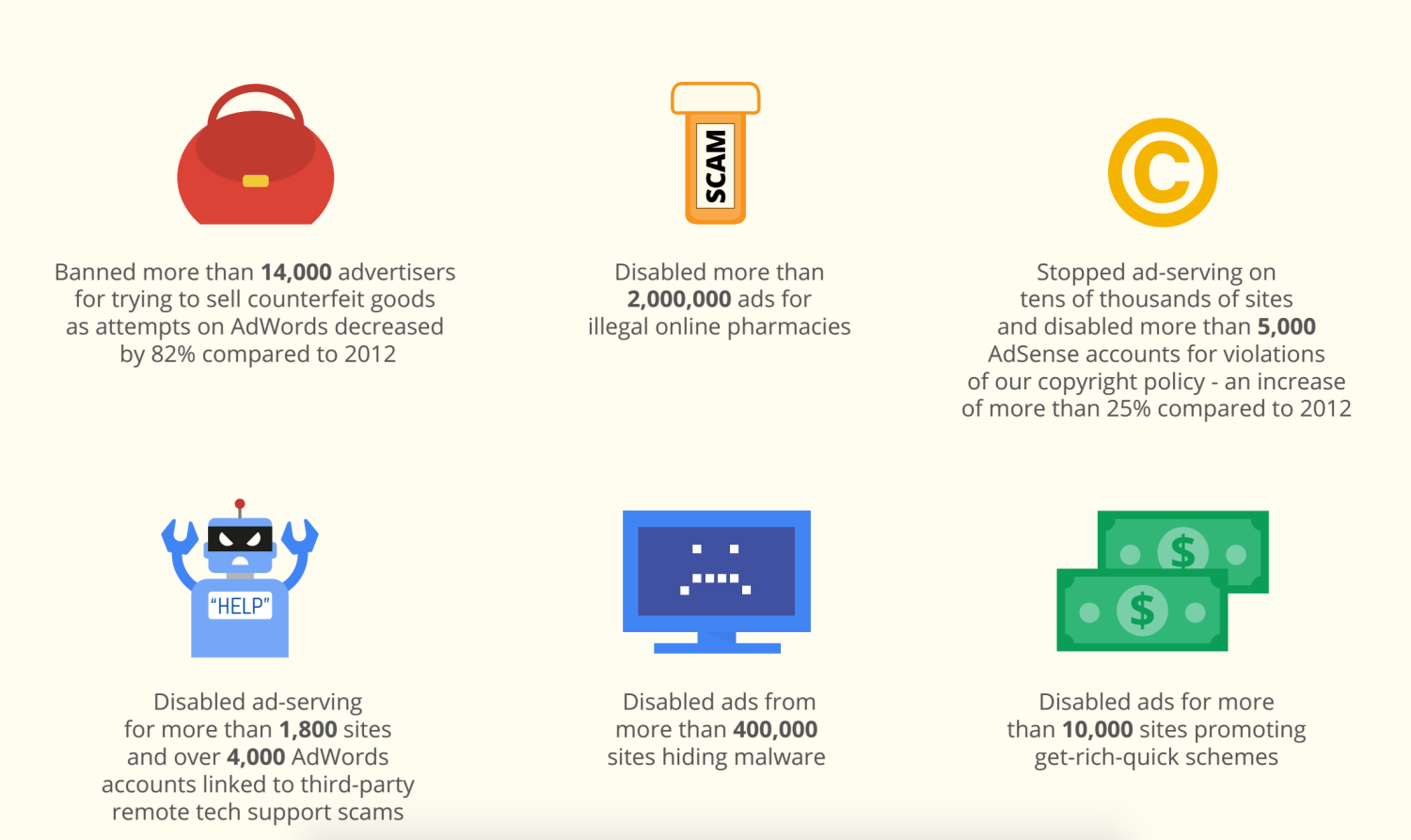4 Ways You Can Avoid an AdWords Suspension
by Casey Walrath • January 3, 2015
Don’t get slapped by the AdWords Suspension robot. Give your visitors true value and flourish.
When it comes to AdWords, there are a lot of things you have to be careful with. The bulk of all advertisers will be just fine, but there are companies who try to run legitimate businesses in industries that are more heavily scrutinized by Google for various reasons.
Below are 4 tips for to keep your AdWords account running smoothly and avoiding an AdWords suspension:
Tip #1 – Keep It On The Up and Up
Back in January 2014, Google’s Inside Adwords blog produced an infographic about Google’s efforts to crack down on bad advertising practices, which included bullet points dedicated to some of the most scrutinized industries using AdWords.
What does that mean? It means that companies trying to advertise in industries with high scrutiny or lots of competitors being suspended need to be extra careful.
Some industries attract companies with dodgy reputations and a history of mistreating and misleading customers. You need to show you’re not like that.
Your first challenge is to demonstrate that you’re one of the good guys, and the way to do this is to disclose as much as possible. Here are some quick ways to do that:
- Be specific about what your service or product entails. What will happen for the visitor once they buy or fill out the form?
- Be very clear that you’re a third party brand if you are one. Don’t use vague or misleading language that insinuates you’re affiliated with any other companies that you’re not, and avoid using third-party brands or logos unless you have permission to do so.
- Include information on your pricing, and make it clear how you charge customers.
- Be careful about promising the world or make outrageous claims that are hard to back up.
[Tweet “Avoid an #AdWords suspension by being very clear and honest with your visitors”]
Tip #2 – Focus On The Value Your Service Provides
Now that you’re avoiding the common pitfalls of an AdWords suspension, you can start focusing on the positive: why should customers use you instead of your competitors?
Depending on what you’re targeting, you may be dealing with inexperienced visitors, so be clear and direct about how your service or product will benefit them. In most industries you’re not just providing a fix to an immediate problem, you should be offering peace of mind.
Like I mentioned earlier, don’t make outrageous promises. You might see other companies doing that, but in heavily scrutinized industries your main goal is to stay on Google’s good side, not just one-up the competition. Focus on the extra value a user gets by using your service.
Tip #3 – Test Landing Page Variants
This is true for every industry. Once you’ve identified your highest volume and best performing AdWords campaigns, start testing landing page variants aggressively.
Test different headlines, test special offers, test different designs. Always have multiple landing page tests running at once so you can figure out how to improve your conversion rates.
If you’re out of ideas, try a new form layout or a multi-step landing page. PPC campaigns are never finished products, and some of the most scrutinized industries on AdWords are also high-traffic, enabling rapid testing.
Tip #4 – Track Your Returns
Of course, this is also true for every industry, but if you’re running an AdWords account, be sure you know how to track returns on specific campaigns and conversions. There are multiple ways to do this, including:
- A dedicated CRM like Marketo, Salesforce, or Base.
- Ads and lead capture forms capable of passing through keyword data through analytics tagging.
- A willingness to crunch the numbers in Excel.
CRMs often have hooks to integrate with landing page platforms and forms, but can be expensive and impractical for smaller businesses, in which case be sure you’re taking the time to track your customers from keyword to conversion wherever possible. If you’re taking phone calls, use unique call tracking numbers to match leads to customers.
If you’re properly tracking everything, you’ll start to learn which keyword and campaigns are most profitable and which should be abandoned.
You should also work directly with Google to make sure your keywords and ads are acceptable. Don’t be afraid to call AdWords support and ask if you’re not sure.
Running a legitimate Google AdWords account doesn’t have to be that hard: just be honest. The most important thing is to make sure you’re running your business with clarity and transparency, and making the extra effort to show that in your ads and landing pages.
Not only will you be more likely to avoid Google’s robot wrath, you’ll end up with happier customers who appreciate your business for a long time with no AdWords suspensions in sight.






